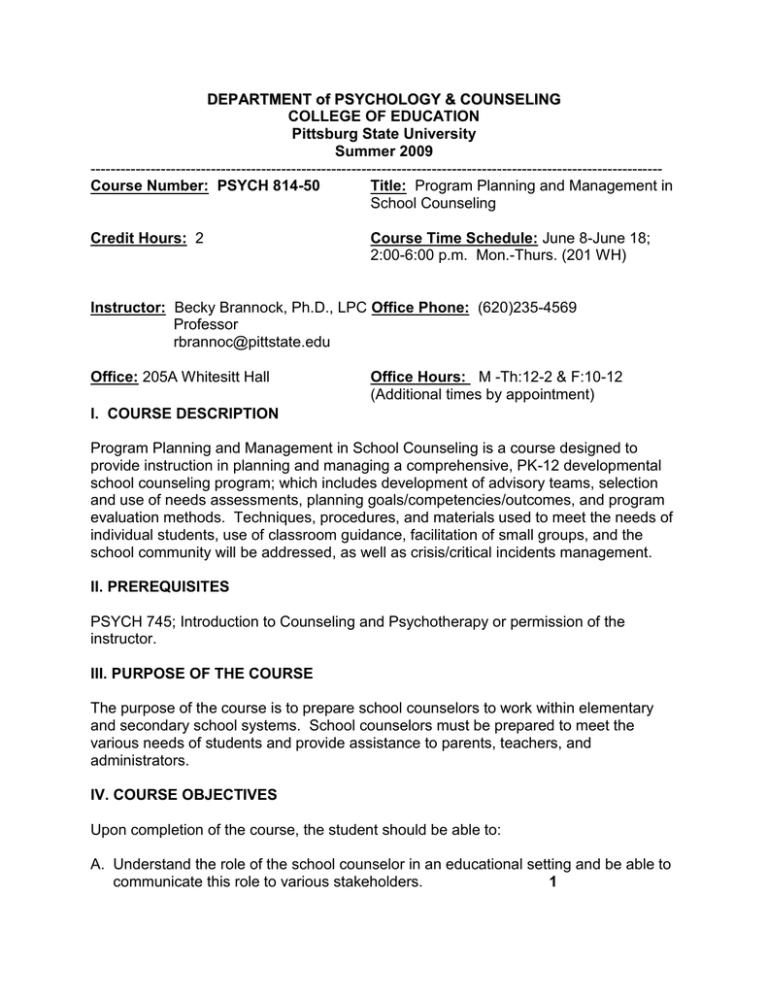PSYCH 814
advertisement

DEPARTMENT of PSYCHOLOGY & COUNSELING COLLEGE OF EDUCATION Pittsburg State University Summer 2009 -----------------------------------------------------------------------------------------------------------------Course Number: PSYCH 814-50 Title: Program Planning and Management in School Counseling Credit Hours: 2 Course Time Schedule: June 8-June 18; 2:00-6:00 p.m. Mon.-Thurs. (201 WH) Instructor: Becky Brannock, Ph.D., LPC Office Phone: (620)235-4569 Professor rbrannoc@pittstate.edu Office: 205A Whitesitt Hall Office Hours: M -Th:12-2 & F:10-12 (Additional times by appointment) I. COURSE DESCRIPTION Program Planning and Management in School Counseling is a course designed to provide instruction in planning and managing a comprehensive, PK-12 developmental school counseling program; which includes development of advisory teams, selection and use of needs assessments, planning goals/competencies/outcomes, and program evaluation methods. Techniques, procedures, and materials used to meet the needs of individual students, use of classroom guidance, facilitation of small groups, and the school community will be addressed, as well as crisis/critical incidents management. II. PREREQUISITES PSYCH 745; Introduction to Counseling and Psychotherapy or permission of the instructor. III. PURPOSE OF THE COURSE The purpose of the course is to prepare school counselors to work within elementary and secondary school systems. School counselors must be prepared to meet the various needs of students and provide assistance to parents, teachers, and administrators. IV. COURSE OBJECTIVES Upon completion of the course, the student should be able to: A. Understand the role of the school counselor in an educational setting and be able to communicate this role to various stakeholders. 1 B. Initiate the development of a comprehensive, developmental PK-12 school counseling program which takes into consideration current research and best practices from the professional literature. C. Organize an advisory team, write counseling program core beliefs, a vision statement, a mission statement, develop a needs assessment instrument and administer the survey, identify priority needs, write goals and competencies for addressing identified needs, develop materials for meeting the needs, and evaluate activities as well as the overall program. D. Identify and utilize a variety of materials for addressing the needs of all students, their teachers, administrators, and parents within the school setting. E. Be aware of the role of the school counselor in crisis intervention or critical incident situations in order to serve in an effective manner V. REQUIRED TEXTS American School Counselor Association. (2005). The ASCA national model: A framework for school counseling programs. (2nd edition). Alexandria, VA: ASCA. Rye, D.R., & Sparks, R. (1999). Strengthening K-12 school counseling programs: A support system approach. (2nd edition). Muncie, IN: Accelerated Development. VI. INSTRUCTIONAL RESOURCES Campbell, C. & Dahir, C. (1997). The national standards for school counseling programs. Alexandria, VA: American School Counselor Association. Dahir, C., Sheldon, C., & Valiga, M. (1998). Implementing the national standards for school counseling programs. Alexandria, VA: American School Counselor Association. Gysbers, N. & Henderson, P. (1997). Comprehensive guidance programs that work-II. Greensboro, NC: ERIC/CASS Publications. 2 Myrick, R.D. (2003). Developmental guidance and counseling: A practical approach. (4th ed.) Minneapolis: Educational Media Corporation. JOURNALS: Professional School Counseling The Journal of Counseling & Development Counseling Today (tabloid) ASCA School Counselor (published bi-monthly) COUNSELING RESOURCE MATERIALS: A comprehensive listing of activity books, kits, video/dvd programs, etc. will be distributed to students. Many of the materials will be used in classroom presentations by the instructor and the students. VII. TEACHING STRATEGIES A. B. C. D. E. F. Lectures and classroom discussions Readings in textbooks, journals, and other materials Group activities Student presentations Guest speakers Videos/dvds VIII. REQUIREMENTS AND EVALUATION A. Attendance is crucial as well as participation in class discussion. Points will be assigned accordingly (see grading scale on p. 4). B. Activities 1. Activity #1: Develop a comprehensive school counseling program which includes: a. proposal with projected timeline for implementation b. advisory team c. core beliefs, vision statement, and mission statement d. needs assessment survey e. identified priority needs f. goals, competencies, and activities g. evaluation--activity & overall program evaluation (DUE DATE: June 18, 2009) 3 2. Activity #2: From Activity 1, give an overall brief synopsis of your comprehensive program. Then choose and present a classroom guidance activity which includes: a. goals b. outcome competencies c. strategies and materials d. evaluation of activities (PRESENTATION DATE: June 18, 2009) 3. Activity #3: Keep a School Counseling Journal. In this journal should be a record of your thoughts regarding ideas for your future school counseling program. You can include the pro’s and con’s about materials presented in class, program implementation, discoveries about seeing yourself as a school counselor, etc. Make entries after each class session. Journals will be due during the final week of class, then returned to you upon completion of the course. (DUE DATE: June 18, 2009) 4. Activity #4: Secure an e-mail address from Computing Services (1st floor Whitesitt) unless you already have a personal account. Send an initial e-mail message to your instructor to document your address. In your message indicate in a paragraph, why you want to be a school counselor. (DUE DATE: June 15, 2009) 5. Activity #5: Throughout the first summer session, join the International Counseling Network (ICN) list-serv. You will be instructed on how to become a member free of charge. Submit welcome page from acceptance response for documentation. Also write 1-2 statements about what you learned in your journal weekly from the list-serv. (DOCUMENTATION DATE: June 16, 2009) C. 1. 2. 3. 4. 5. 6. 7. Evaluation Criteria: Attendance/Classroom Participation Written Plan Program Presentation School Counseling Journal E-mail ICN Documentation TOTAL D. 1. 2. 3. 4. 5. Grading Scale: A = 300-270 points B = 269-240 points C = 239-210 points D = 209-180 points F = 179 points & below 100 points 50 points 50 points 50 points 25 points 25 points 300 points 4 Course Outline -Summer 2009- M(6/8): Introductions; Historical Perspectives of School Counseling; Role of School Counselor; Chapters 2, 4, & 5. (Organize into groups for program plan) T(6/9): Chapters 3 & 6; Computer Lab W(6/10): Chapter 7; Computer Lab Th(6/11) : MO & KS Models; Elementary School Counselor speaker; Crisis Planning/Critical Incidents speaker; Computer Lab M(6/15): Chapters 8 & 9; Computer Lab EMAILS DUE. T(6/16): ASCA National Standards & National Model; Public Relations/Advocacy; Team Building Activity (Bring newspapers & masking tape per group); Computer Lab ICN DOCUMENTATION DUE. W(6/17): Resources Preview of School Counseling Materials; Counseling Center Planning; Computer Lab Th(6/18): COMPREHENSIVE PROGRAM PRESENTATIONS: (Elementary/Middle School/High School); Middle School Counselor speaker *WRITTEN COMPREHENSIVE PROGRAMS DUE. SCHOOL COUNSELING JOURNALS DUE. 5


